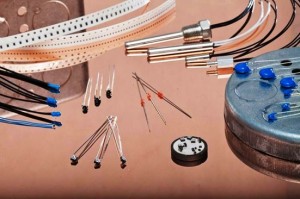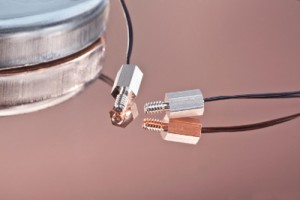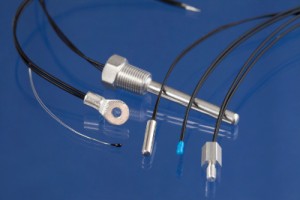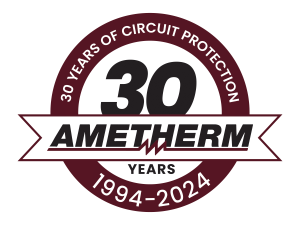This resistance can be measured by using a small and measured direct current, or dc, passed through the thermistor in order to measure the voltage drop produced.
These solid state temperature sensors actually act like electrical resistors that are temperature sensitive. That is where the name, a clear combination of the words thermal and resistor, comes from. Ametherm specializes in NTC, or negative temperature coefficient, thermistors.
Thermistors are an incredibly accurate category of temperature sensors
In general, thermistors are composed of sintered ceramics consisting of highly sensitive material with consistently reproducible properties of resistance versus temperature.
“The demand for thermistors has also increased in the automotive industry, especially, in applications such as powertrain, safety and controls and alternative fuel vehicles due to the change in government standards and demand patterns from the end users. A total of 30 thermistors are used in an automotive, which include 20 negative temperature coefficient (NTCs) and 5 positive temperature coefficient (PTCs) sensors. Thermistors are currently a steady growing market and is expected to continue the same trend in coming years as well.” Sensors Online
NTC Thermistors are non-linear resistors, which alter their resistance characteristics with temperature. The resistance of NTC will decrease as the temperature increases. The manner in which the resistance decreases is related to a constant known in the electronics industry as beta, or ß. Beta is measured in °K.
NTC Thermistor Probes


Typical applications Include:
- Temperature Measurement
- Temperature Compensation
- Temperature Control
You can easily calculate the resistance of NTC Thermistors at a given temperature using beta, but there is an even more accurate way to do this using the Steinhart & Hart Equation. NTC Thermistors are also an excellent alternative to semiconductor circuitry for solving temperature related problems. They can be easily used to calculate the temperature coefficient. We will provide you with guidelines for using NTC Thermistors to achieve the most accurate measurements possible.
Some basic terminology may be helpful in understanding thermistors and their potential uses. First, standard reference temperature is usually 25°C , or the temperature of the thermistor body when supposed zero-power resistance is seen. This zero-power resistance is the dc resistance value of the thermistor when measured at a specific temperature with a low enough power dissipation from the thermistor for any further power decrease resulting in no more than the smaller of 1/10 of the particular measurement tolerance or a zero point one percent change in the resistance .
 Resistance ratio is a characteristic that identifies the ratio of zero-power resistance of a thermistor at 125° to the resistance at 25°C. Maximum operating temperature is the highest body temperature where the thermistor will operate with acceptable stability for an extensive time period.
Resistance ratio is a characteristic that identifies the ratio of zero-power resistance of a thermistor at 125° to the resistance at 25°C. Maximum operating temperature is the highest body temperature where the thermistor will operate with acceptable stability for an extensive time period.
This temperature should not surpass the highest value specified. Likewise, maximum power rating for thermistors is the highest power at which a thermistor will operate for a period of time while maintaining stability.
Ametherm’s NTC thermistors are:
- Available in an array of designs to fit nearly any desired application
- Created using the best high purity materials for reliable results you can count on
- Customizable to fully meet your needs





